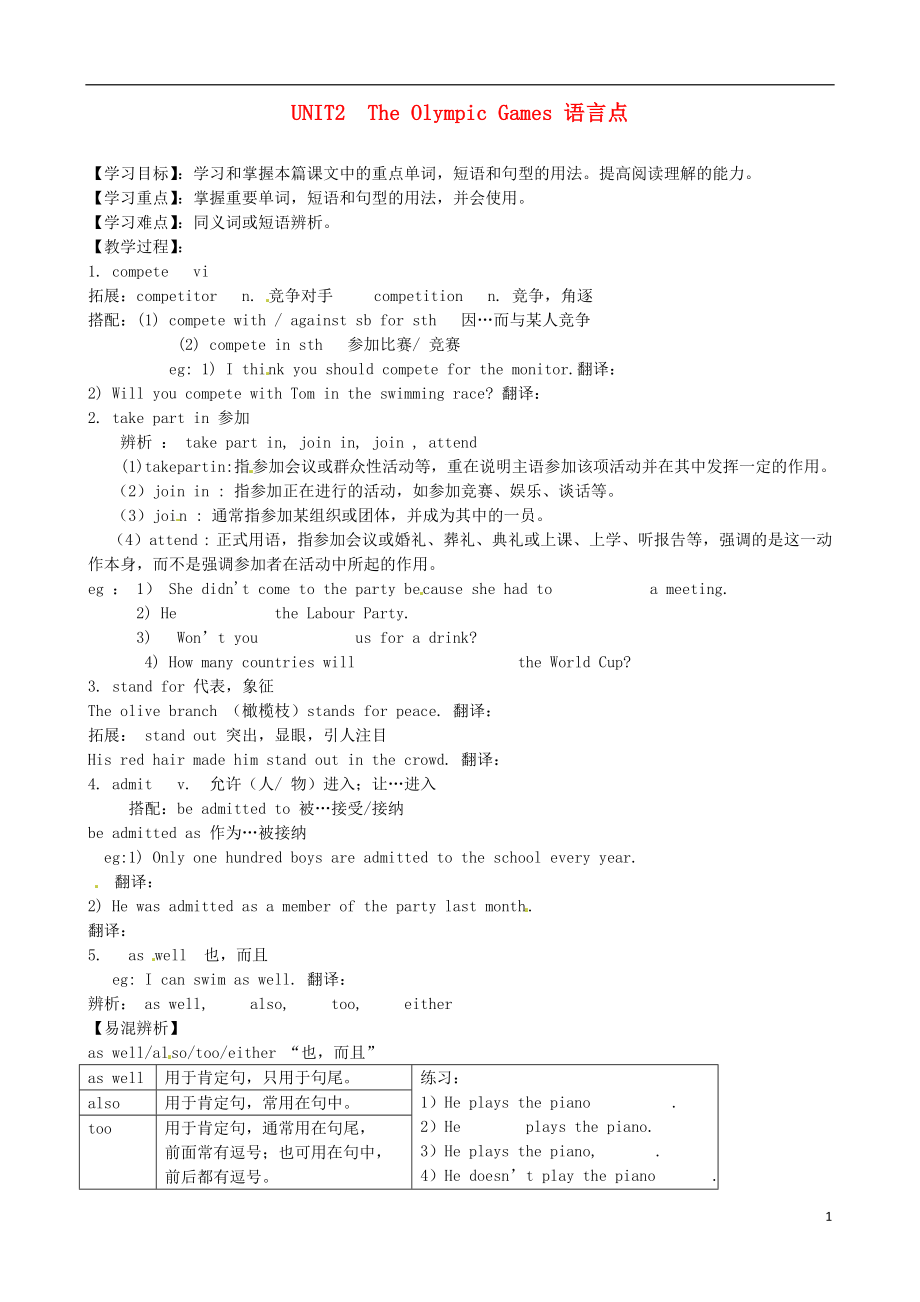《河北省沙河市二十冶綜合學(xué)校高中分校高中英語(yǔ) Unit2 The Olympic Games 語(yǔ)言點(diǎn)導(dǎo)學(xué)案(無答案)新人教版必修2》由會(huì)員分享,可在線閱讀�,更多相關(guān)《河北省沙河市二十冶綜合學(xué)校高中分校高中英語(yǔ) Unit2 The Olympic Games 語(yǔ)言點(diǎn)導(dǎo)學(xué)案(無答案)新人教版必修2(2頁(yè)珍藏版)》請(qǐng)?jiān)谘b配圖網(wǎng)上搜索。
1��、
UNIT2 The Olympic Games 語(yǔ)言點(diǎn)
【學(xué)習(xí)目標(biāo)】:學(xué)習(xí)和掌握本篇課文中的重點(diǎn)單詞�����,短語(yǔ)和句型的用法�。提高閱讀理解的能力。
【學(xué)習(xí)重點(diǎn)】:掌握重要單詞���,短語(yǔ)和句型的用法,并會(huì)使用�����。
【學(xué)習(xí)難點(diǎn)】:同義詞或短語(yǔ)辨析�。
【教學(xué)過程】:
1. compete? vi
拓展:competitor? n. 競(jìng)爭(zhēng)對(duì)手?? competition? n. 競(jìng)爭(zhēng)���,角逐??
搭配:(1) compete with / against sb for sth? 因…而與某人競(jìng)爭(zhēng)
????? (2) compete in sth? 參加比賽/ 競(jìng)賽
?????eg: 1)
2、 I think you should compete for the monitor.翻譯:
2) Will you compete with Tom in the swimming race? 翻譯:
2. take part in 參加
??辨析 : take part in, join in, join , attend
? (1) take part in : 指參加會(huì)議或群眾性活動(dòng)等���,重在說明主語(yǔ)參加該項(xiàng)活動(dòng)并在其中發(fā)揮一定的作用。
? (2)join i
3����、n : 指參加正在進(jìn)行的活動(dòng),如參加競(jìng)賽�����、娛樂�����、談話等�����。
? (3)join : 通常指參加某組織或團(tuán)體����,并成為其中的一員�����。
? (4)attend : 正式用語(yǔ)���,指參加會(huì)議或婚禮、葬禮����、典禮或上課、上學(xué)��、聽報(bào)告等���,強(qiáng)調(diào)的是這一動(dòng)作本身��,而不是強(qiáng)調(diào)參加者在活動(dòng)中所起的作用�。
eg : 1) She didn't come to the party because she had to a meeting.
?? 2) He the Labour Party.
?? 3) ?Won’t you us for a dr
4���、ink?
4) How many countries will the World Cup?
3. stand for 代表����,象征
The olive branch (橄欖枝)stands for peace. 翻譯:
拓展: stand out 突出��,顯眼����,引人注目
His red hair made him stand out in the crowd. 翻譯:
4. admit? v. 允許(人/ 物)進(jìn)入;讓…進(jìn)入
5���、
?? 搭配:be admitted to 被…接受/接納
be admitted as 作為…被接納
?eg:1) Only one hundred boys are admitted to the school every year.
翻譯:
2) He was admitted as a member of the party last month.
翻譯:
5.? as well
6�、?也��,而且
? eg: I can swim as well. 翻譯:
辨析: as well,?? also,?? too,?? either
【易混辨析】
as well/also/too/either “也���,而且”
as well
用于肯定句���,只用于句尾。
練習(xí):
1)He plays the piano .
2)He plays the piano.
3)He plays the piano, .
4)He doesn’t play the piano .
7���、
also
用于肯定句����,常用在句中�����。
too
用于肯定句,通常用在句尾�,
前面常有逗號(hào);也可用在句中����,
前后都有逗號(hào)。
either
用于否定句���,常用在句尾����。
6.in charge?? 主管�����,看管
eg: The monitor will be in charge when the headteacher is away.
翻譯:
辨析: in charge of : “負(fù)責(zé)�,主管”,表示主動(dòng)
?????? in the charge of : “由…管理”����,表示被動(dòng)。
8�����、eg: 1) He was left in charge of the shop while the manager was away.
翻譯:
2) Class one is in the charge of Miss Li. 翻譯:
7 bargain with sb over / about / for sth? 就…與某人討價(jià)還價(jià)
?eg: He was bargaining with the sh
9�����、op owner over the price.
?翻譯:
8. every four years? 每四年�,每隔三年
every+基數(shù)詞+復(fù)數(shù)名詞 每……
every+序數(shù)詞+單數(shù)名詞
every other+單數(shù)名詞(每隔一個(gè))
every few+復(fù)數(shù)名詞(每幾個(gè))
eg: every four days = every fourth day 每四天,每隔三天 every other day / line? 每隔一天/ 行? every few
10�、 days?? 每幾天???? every two or three days? 每隔三天
?【注】every 表示“每隔...的”,其后不可接 a few, some , many, several 等詞����。
【學(xué)以致用】
每?jī)商?
He comes here every three days (every third day).
?翻譯:
You'd better plant a tree every five meters(every fifth meter). ?
翻譯:
2
 河北省沙河市二十冶綜合學(xué)校高中分校高中英語(yǔ) Unit2 The Olympic Games 語(yǔ)言點(diǎn)導(dǎo)學(xué)案(無答案)新人教版必修2
河北省沙河市二十冶綜合學(xué)校高中分校高中英語(yǔ) Unit2 The Olympic Games 語(yǔ)言點(diǎn)導(dǎo)學(xué)案(無答案)新人教版必修2

